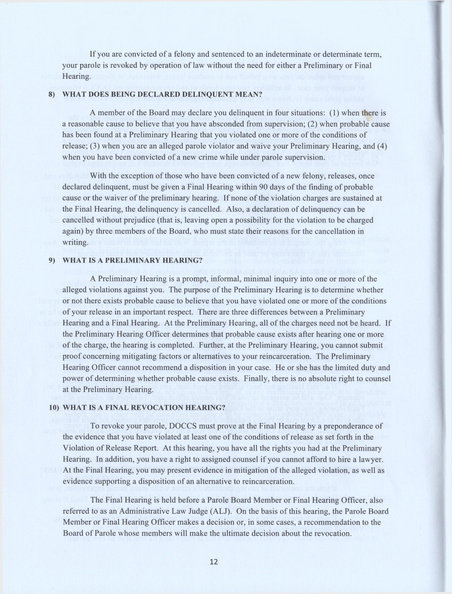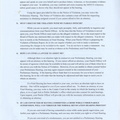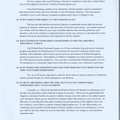
If you are convicted of a felony and sentenced to an indeterminate or determinate term, your parole is revoked by operation of law without the need for either a Preliminary or Final Hearing.
8) WHAT DOES BEING DECLARED DELINQUENT MEAN?
A member of the Board may declare you delinquent in four situations: (1) when there is a reasonable cause to believe that you have absconded from supervision; (2) when probable cause has been found at a Preliminary Hearing that you violated one or more of the conditions of release; (3) when you are an alleged parole violator and waive your Preliminary Hearing, and (4) when you have been convicted of a new crime while under parole supervision.
With the exception of those who have been convicted of a new felony, releases, once declared delinquent, must be given a Final Hearing within 90 days of the finding of probable cause or the waiver of the preliminary hearing. If none of the violation charges are sustained at the Final Hearing, the delinquency is cancelled. Also, a declaration of delinquency can be cancelled without prejudice (that is, leaving open a possibility for the violation to be charged again) by three members of the Board, who must state their reasons for the cancellation in writing.
9) WHAT IS A PRELIMINARY HEARING?
A Preliminary Hearing is a prompt, informal, minimal inquiry into one or more of the alleged violations against you. The purpose of the Preliminary Hearing is to determine whether or not there exists probable cause to believe that you have violated one or more of the conditions of your release in an important respect. There are three differences between a Preliminary Hearing and a Final Hearing. At the Preliminary Hearing, all of the charges need not be heard. If the Preliminary Hearing Officer determines that probable cause exists after hearing one or more of the charge, the hearing is completed. Further, at the Preliminary Hearing, you cannot submit proof concerning mitigating factors or alternatives to your reincarceration. The Preliminary Hearing Officer cannot recommend a disposition in your case. He or she has the limited duty and power of determining whether probable cause exists. Finally, there is no absolute right to counsel at the Preliminary Hearing.
10) WHAT IS A FINAL REVOCATION HEARING?
To revoke your parole, DOCCS must prove at the Final Hearing by a preponderance of the evidence that you have violated at least one of the conditions of release as set forth in the Violation of Release Report. At this hearing, you have all the rights you had at the Preliminary Hearing. In addition, you have a right to assigned counsel if you cannot afford to hire a lawyer.
At the Final Hearing, you may present evidence in mitigation of the alleged violation, as well as evidence supporting a disposition of an alternative to reincarceration.
The Final Hearing is held before a Parole Board Member or Final Hearing Officer, also referred to as an Administrative Law Judge (ALJ). On the basis of this hearing, the Parole Board Member or Final Hearing Officer makes a decision or, in some cases, a recommendation to the Board of Parole whose members will make the ultimate decision about the revocation.


0 comments